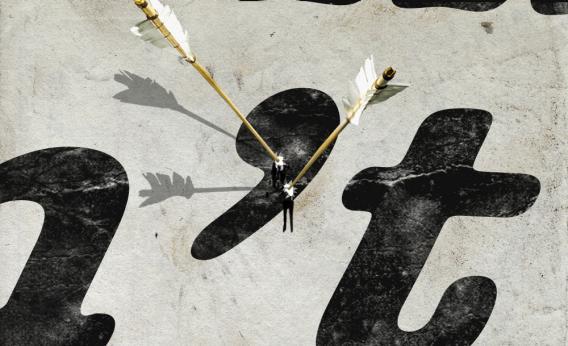The English language would be better off without apostrophes.
Yes, I know thats an extreme statement, and yes, I know its not likely ever to happen. But its true. Heres why.
1. Most of them dont add anything useful
Why are so many people so confused by apostrophes? Because they cant hear them in speech, and they dont serve a valuable grammatical function. They simply mark contraction or possession, and you can tell the meaning without them. If you couldnt, the indignant red-pen-wielding self-appointed correction brigades wouldnt know for sure which ones were wrong because the meaning wouldnt be clear. But they always do know, because the meaning is clear even when the apostrophe is used wrongly or omitted.
Look at common contractions. In the nots—isnt, arent, doesnt, wont, cant, didnt, shouldnt, etc.—most dont have anything they could be mistaken for, and cant and wont are nouns that wouldnt show up in the same places.
In contractions like hes, shes, youre, theyre, and its, there are ones no one gets wrong, and there are ones that are gotten completely wrong all the time (theyre/their/there, youre/your). Either way, people still know what the writer means. Every. Single. Time. The apostrophe makes no difference.
In Ill, youll, hell, shell, well, itll, and theyll, there are some apparent points of confusion. “Ill do it if hell do it and shell do it” might seem like odd English referring to sickness, Hades, and mollusks. But odds are very good you understood it anyway.
And in possessives? Thats where people get them wrong most often, and yet we always know what they mean.
2. George Bernard Shaw did it and so can you
The noted, widely read, widely performed, and highly quotable playwright George Bernard Shaw did away with most apostrophes in published editions of his plays, which include Major Barbara, Arms and the Man, and Pygmalion—which My Fair Lady was based on. Their abolition has done no harm there. I am not using them in this article, and theres no place where my meaning is harmed by their absence. The biggest problem you will run into if you decide to do away with them is that your autocorrect wont want you to.
Yes, there are a few places where there would be a small potential for ambiguity. They wouldnt exactly be the only ambiguous things in English. And theyre small potatoes in comparison to the confusion and general social havoc attendant on the use of apostrophes. Social havoc? Why, yes …
3. Many apostrophes are really only there for condescension
Apostrophes do have one consistent function: The grammar griper brigade likes to use them as the tips on their cats-o-nine-tails. Theyre excellent tools for condescension. Dont tell me theres no classism in terms like “greengrocers apostrophe” (for apostrophes in plurals). Such agitation over a little mark that conveys nothing new—other, evidently, than, “This person doesnt know how to use apostrophes.” Its a fashion infraction on the level of wearing white after Labor Day or socks with sandals.
In fact, the apostrophe in the possessive forms is there only because some people wanted to show their superior knowledge. It wasnt there originally. The possessive s in modern English is descended from one of several Old English forms: es, e, an, and a. Only the es form survived—with the e dropped—when English nouns lost most of their inflections. They did not have apostrophes. Meanwhile, the plural forms reduced from as, u, an, a, or nothing to just as (changed to es or s) or nothing. But we got along fine without anything to mark the difference, as we still do when were speaking.
But starting in the 1600s, English writers borrowed the new French model of using an apostrophe to indicate where a letter had been omitted—as in poetic “lov’d,” for instance—and some bright sparks decided to put it in the possessive … not simply because there used to be an e there but because they thought that a possessive such as “Toms” was really short for “Tom his”!
You see, there were occasionally occurrences of the “John his house” sort of thing in Old English texts, and it became more popular in Shakespearean times, perhaps because with the dropping of the “h” in “his” it often sounded about the same. Many people wrongly believed that this “Tom his book” form was the origin of the possessive form (ignoring not only history but the fact that the possessive is also s where we would say “her” or “their”). They wanted to put in the apostrophe in possessives to wave around the fact that they knew the truth! Even though they actually didnt.
So, in no small measure, possessive apostrophes exist because some people who were wrong wanted to “correct” people who were actually right.
4. Even where an apostrophe can add something useful, we usually get by without it
There are a few places where apostrophes can be useful. When youre talking about As and Bs or Ps and Qs, they help, but theyre not essential. An apostrophe tells you that the whiskey maker is Jack Daniel, not Jack Daniels, but most people get that wrong anyway. When we talk of decades like the 80s and 90s, an apostrophe before the number makes it clear that weve left off the 19 (or 18), but most people stick the apostrophe before the s instead anyway.
5. Youll type faster
Matthew J.X. Malady profiled major figures in the pro and anti-apostrophe camps here on Slate earlier this year. Ted Gibson, a professor of cognitive sciences at MIT, concluded that the only significant result of ridding our language of these marks is that “people would be able to type a little bit faster. That’s it.” Which frees up time to worry about things that are really important. Like commas.
A version of this post, containing three additional reasons to kill the apostrophe, originally appeared in The Week.
